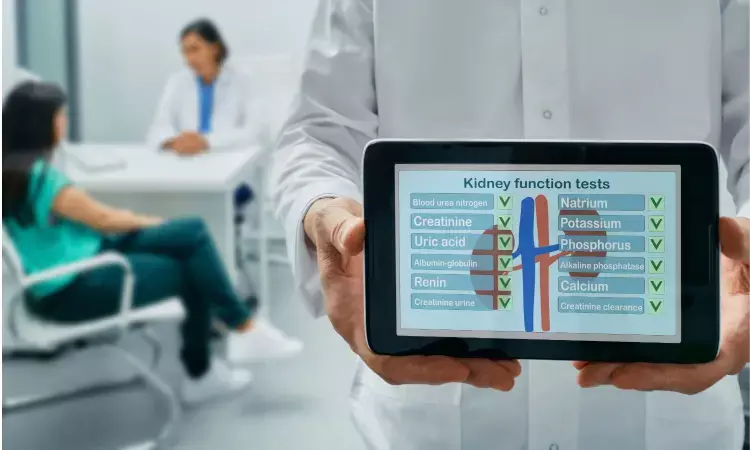- Home
- Medical news & Guidelines
- Anesthesiology
- Cardiology and CTVS
- Critical Care
- Dentistry
- Dermatology
- Diabetes and Endocrinology
- ENT
- Gastroenterology
- Medicine
- Nephrology
- Neurology
- Obstretics-Gynaecology
- Oncology
- Ophthalmology
- Orthopaedics
- Pediatrics-Neonatology
- Psychiatry
- Pulmonology
- Radiology
- Surgery
- Urology
- Laboratory Medicine
- Diet
- Nursing
- Paramedical
- Physiotherapy
- Health news
- Fact Check
- Bone Health Fact Check
- Brain Health Fact Check
- Cancer Related Fact Check
- Child Care Fact Check
- Dental and oral health fact check
- Diabetes and metabolic health fact check
- Diet and Nutrition Fact Check
- Eye and ENT Care Fact Check
- Fitness fact check
- Gut health fact check
- Heart health fact check
- Kidney health fact check
- Medical education fact check
- Men's health fact check
- Respiratory fact check
- Skin and hair care fact check
- Vaccine and Immunization fact check
- Women's health fact check
- AYUSH
- State News
- Andaman and Nicobar Islands
- Andhra Pradesh
- Arunachal Pradesh
- Assam
- Bihar
- Chandigarh
- Chattisgarh
- Dadra and Nagar Haveli
- Daman and Diu
- Delhi
- Goa
- Gujarat
- Haryana
- Himachal Pradesh
- Jammu & Kashmir
- Jharkhand
- Karnataka
- Kerala
- Ladakh
- Lakshadweep
- Madhya Pradesh
- Maharashtra
- Manipur
- Meghalaya
- Mizoram
- Nagaland
- Odisha
- Puducherry
- Punjab
- Rajasthan
- Sikkim
- Tamil Nadu
- Telangana
- Tripura
- Uttar Pradesh
- Uttrakhand
- West Bengal
- Medical Education
- Industry
Renal resistive indices may independently predict disease progression and mortality in CKD patients

Chronic kidney disease is a significant global public health issue, affecting at least one in ten adults. Factors like obesity, hypertension, and diabetes contribute to its rising prevalence. Determining prognostic markers for CKD and assessing their independent association with outcomes remains challenging. Kidney ultrasound is the gold standard imaging technique for ruling out urinary tract obstruction, assessing kidney size, and evaluating corticomedullary differentiation.
A recent study published in BMC Nephrology led by Dr Chloe Kharsa and colleagues has concluded that those with elevated Renal resistive indices (RRI) ≥ 0.7 are at a higher risk of mortality following adjustment to medications and lifestyle modifications. According to this study, It can be considered an independent prognostic factor in CKD patients.
RRI predict kidney disease progression. The present study evaluated the association of RRI with mortality and dialysis initiation after adjustment to therapeutic and lifestyle interventions.
This retrospective study analyzed data from CKD patients who were followed for at least two years in three nephrology clinics ( between 2006 and 2019). These patients had a recorded RRI level. The Kaplan Meier and log-rank tests compared survival between normal and high RRI patients. Cox regression analysis assessed the relationship between RRI and death or dialysis after adjustments.
Key findings from the study are:
- One hundred ninety-two patients were analyzed with a mean age of 66 years, with 78% males.
- 68 patients had RRI < 0.7 and 124 had RRI ≥ 0.7.
- There was a negative correlation between baseline eGFR and RRI.
- The survival was significantly better in patients with RRI < 0.7 with a Log Rank test < 0.001.
- There was a significant association between RRI and mortality with HR of 1.08 based on univariate Cox regression analysis that remained significant following adjustment to cardiovascular risk factors and interventions. This included salt reduction, BP control, statins and RAAS inhibitors.
- According to Cox regression analysis, there was a significant association between RRI and dialysis initiation with HR = 1.06.
They said, "Our study revealed that mortality risk is higher in patients with an elevated RRI ≥ 0.7 after adjustment to medications and lifestyle modifications. "
According to our results, an increase of 0.01 in RRI increases the death by 7% after a mean follow-up of 73 months. They added that this association is sustained after adjustment to cardiovascular risk factors, kidney function, ACR, and therapeutic and lifestyle interventions.
The study's limitations include a retrospective nature, absence of Doppler US after implementation of treatment and lifestyle modifications, bias in patient selection, and the definition of compliance to salt reduction not being homogenous in all cases.
Reference:
Kharsa, C., Beaini, C., Chelala, D. et al. Association of renal resistive indices with kidney disease progression and mortality. BMC Nephrol 24, 348 (2023). https://doi.org/10.1186/s12882-023-03398-6
BDS, MDS in Periodontics and Implantology
Dr. Aditi Yadav is a BDS, MDS in Periodontics and Implantology. She has a clinical experience of 5 years as a laser dental surgeon. She also has a Diploma in clinical research and pharmacovigilance and is a Certified data scientist. She is currently working as a content developer in e-health services. Dr. Yadav has a keen interest in Medical Journalism and is actively involved in Medical Research writing.
Dr Kamal Kant Kohli-MBBS, DTCD- a chest specialist with more than 30 years of practice and a flair for writing clinical articles, Dr Kamal Kant Kohli joined Medical Dialogues as a Chief Editor of Medical News. Besides writing articles, as an editor, he proofreads and verifies all the medical content published on Medical Dialogues including those coming from journals, studies,medical conferences,guidelines etc. Email: drkohli@medicaldialogues.in. Contact no. 011-43720751


